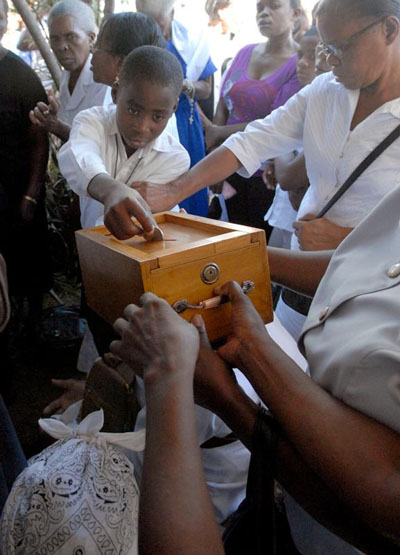
A Haitian boy drops money into the collection box during a Mass in Port-au-Prince. Almsgiving is a true Lenten sacrifice because we do it without expecting to receive anything in return. (CNS photo/Peter Finney, Clarion Herald)
We all recognize Lent as a time of sacrifice, a time to prepare ourselves for the commemoration of Jesus Christ’s passion, death and resurrection. Traditionally, there are three pillars of this intensely spiritual and ascetic period that can help us grow in charity and perfect penitence: prayer, fasting and almsgiving.
Prayer and fasting are the most widely understood of these three pillars, as is their connection to the 40 days of Lent. In these 40 days, we unite ourselves with Christ in the desert, as he prepared for his ministry. He fasted; he fervently prayed. But did he give alms?
Almsgiving calls for a great examination. What exactly does it mean to give alms? How does this relate to prayer and fasting, particularly in the context of Lenten sacrifice?
Almsgiving is more than handing out money; it is about the universal destination of goods, a term used in Catholic social teaching. The Catechism of the Catholic Church reminds us that “the goods of creation are destined for the entire human race” (No. 2452).
Far from being a sort of socialist mantra, this is a reminder of our responsibility to our brothers and sisters in the truest sense of “caritas,” or charity: “Giving alms to the poor is a witness to fraternal charity: It is also a work of justice pleasing to God” (No. 2462).
It is just, and the height of mercy, to give of ourselves and our goods for the sake of others. There is perhaps no better time to practice such a virtue than the season of preparing for the paschal mystery.
Almsgiving is not just about giving money to the church, putting a few dollars into the donation basket. It is about giving of what we have — and giving of ourselves.
[hotblock]
How many of us have more than we truly need? And how much of that excess do we pass along to our brothers and sisters? Jesus lauds the poor widow who gives of her meager means (see Mk 12:41-44), even in her poverty. We are all called to embrace this spirit of charity.
In the Acts of the Apostles, we are reminded that “it is more blessed to give than to receive” (Acts 20:35). In Tobit we read that “prayer with fasting is good. Almsgiving with righteousness is better than wealth with wickedness. It is better to give alms than to store up gold, for almsgiving saves from death, and purges all sin. Those who give alms will enjoy full life” (Tb 12:8-9).
What is it that unites the three pillars of Lent together? These pillars help us to empty ourselves, in the spirit of Jesus’ emptying of himself: “Rather, he emptied himself, taking the form of a slave, coming in human likeness; and found human in appearance, he humbled himself, becoming obedient to death, even death on a cross” (Phil 2:7-8).
We go beyond ourselves and seek the good of the other and the glorification of God, at the expense of our own egos, at the expense of our own comfort. Such acts of sacrifice and self-mortification help to put us in harmony with God again, help us to reforge the relationship that was fractured by our sin.
Almsgiving is a true Lenten sacrifice because we do it without expecting to receive anything in return.
Jesus tells us, “When you hold a lunch or a dinner, do not invite your friends or your brothers or your relatives or your wealthy neighbors, in case they may invite you back and you have repayment. Rather, when you hold a banquet, invite the poor, the crippled, the lame, the blind; blessed indeed will you be because of their inability to repay you” (Lk 14:12-14).
It is in this spirit that we give, and in a special way during Lent.
We are not doing this because we will receive something ourselves; we do it for love of our neighbor, and to fulfill the command of our Lord.
[hotblock2]
Our almsgiving is to be done in the truest sense of “caritas” — self-sacrificial love. The charitable work of the church and her members is not just about alleviating earthly suffering or righting earthly wrongs. As in all things, the point of such charity is the salvation of souls.
When we give alms, we give not only money; we give our time; we give our talents; we sacrifice our own comfort and desires for the sake of others, for their good. This is mercy in a very real sense.
In fact, the term “alms” ultimately owes its origin to the Greek term “eleos,” meaning mercy, and almsgiving is at its heart a merciful offering of ourselves in love.
We follow the example of Jesus Christ. During this Lenten season, we strive to unite ourselves with him who gave everything, including his very life, so that we might have eternal life in us. We pray, we fast, we give alms in order that we might more closely conform to his example.
***
Senz is a freelance writer living in Oregon with his family.


Share this story